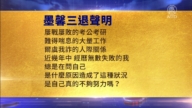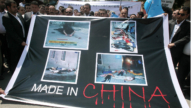【新唐人2011年12月24日讯】中国互联网数据中心日前发布《中国宽频用户调查》报告,调查显示,2011年前三季度绝大部分互联网用户在使用“假宽频”,上网平均速度达不到标定速度,但每月的费用却是香港的469倍。中国电信业的问题再次成为社会各界关注的焦点。网民表示,在中国假货太多了,利益压过效率,属于商业欺诈,同时也是国有资本垄断导致的结果。
调查显示,2011年前三季度中国固网宽频与3G用户数累积达到1.5亿与1.02亿,但中国绝大部分互联网用户在使用“假宽频”。
调查表明,超过半数用户上网宽频下载速率,低于运营商提供的名义宽频速率。
数据显示,使用4M宽频的用户中,应享有每秒512KB的网速,实际平均速度在每秒400KB以下的占91.2%﹔使用2M宽频,理论网速是每秒256KB,实际平均速度在每秒200KB以下的占83.5%﹔使用1M宽频,实际平均网速在每秒100KB以下的占67.6%,与名义速度差异极大。
但报告还指出,宽频费用方面,大陆固网宽频用户上网1M带宽,每月费用实际折合13.13美元,是越南的3倍、美国的4倍、韩国的29倍、香港的469倍。
《六四天网》义工浦飞:“如果按照两国人员的收入比来讲,这个差距是非常惊人的。就是这个费用从占有日常收入的工资收入比来讲,这个费用非常惊人。同时,由于中国的宽带互联网路是被国家所控制的国有控股公司来垄断,长期以来,它的下载速度和上传速度都达不了他们所承诺的要求。”
大陆网民菁菁:“就是打开网站的时候,特别是打开空间的时候,网速特别慢。现在说是3兆的,在公司里的时候说是3兆的。3兆的但是我觉得跟家里1兆的都一样的,反正都挺慢的。”
对于收费方面,大陆网民菁菁表示,在那个环境里没有办法,只能无奈的接受。
菁菁:“你就是再怎么不满意,它就是这么规定的,咱也没有办法。主要它就是强行的,你要按几兆的规定多少钱,650、700(人民币),它就是这么限制的,那只要你上网就得去交钱。”
上个月,中共喉舌报导了“中电信”和“中联通”两公司,涉嫌在宽频接入领域存在垄断。《南方都市报》社论表示,电信行业本身属于国家特定行业和领域,采取限制其他主体进入的方式来特许经营,是最明显也是最主要的国有资本垄断行业之一。
所以,对于这次《中国宽频用户调查》公布的这个数据,《六四天网》义工浦飞认为,这些数据证明中国互联网长期处于一种商业欺诈行为。
浦飞:“由于很多小区的布线情况,很多小区完全达不到它所承诺的。技术设计,它也达不到它所承诺的那个带宽。但是中国的互联网的运营商,也依然向他们销售这种高宽带的服务。这是一个违背基本商业道德的行为。”
而《万家网》评论说,中国每年产生的“电信欺诈性收费”现象数不胜数,整个社会对电信业的不满日益加深,而能够通过投诉或诉讼获得返还的数额却微乎其微。不知“霸王”条款何时能叫停?
新唐人记者唐睿、李若琳采访报导。
China’s Broadband: Slower Speed with Sky High Costs
China’s Internet Data Center recently released a report on
" A survey of China’s Broadband Users".
The survey shows that in China, the vast majority of
internet users used unqualified broadband services in the first three quarters of 2011.
The actual broadband speed is lower than the nominal,
charges are 469 times higher than those in Hong Kong.
Problems with China’s telecomm monopoly have once again
become the focus of the public’s attention.
Chinese netizens say that China is full of fake commodities.
The telecomm sector places interests over efficiency,
its practice should be classified as commercial fraud,
this is the result of having state-owned monopolies.
The survey shows that in the first three quarters of 2011,
the number of Chinese users of fixed-line broadband and
3G wireless service reached 150 million and 102 million,
respectively.
However, the vast majority of them are using
“fake broadband” services.
The report reveals that over half of broadband users’ actual
download speed is slower than the operators’ nominal speed.
The nominal speed for 4M broadband users is claimed to be
512KB per second,
while in reality, 91.2% of the said users are offered
below-400KB service.
For 2M broadband with a nominal speed at 256KB per second,
83.5% of 2M broadband users were actually given below 200KB.
Of 1M broadband users, the percentage of below-100KB speed
accounts for 67.6%, with its nominal 128KB speed.
In terms of broadband charges, China’s users pay about
USD 13.13 for a monthly 1M broadband service.
The cost is three times that in Vietnam, four times that in the U.S.,
29 times that in South Korea and 469 times that in Hong Kong.
64tianwang.com volunteer Pu Fei says: “If calculated on the
basis of general income, the gap is strikingly wide.
Even the percentage of the broadband cost that accounts for
the Income is found to be staggering.
What’s more, China’s broadband business has been wholly
controlled by government-owned holding companies.
For a long time, the download and upload speeds have
fallen short of stated company commitments."
Chinese netizen Jingjing says: “Getting access to websites
is particularly slow, especially to the web space.
The speed is said to be 3M per second for the company user.
But I feel it’s just the same as the home service of 1M speed,
and , both speeds are quite slow."
As to the broadband charges, Jingjing says in that environment,
there are no other alternatives, so they have to accept it.
Jingjing says: “No matter how dissatisfied you are,
you have to follow their regulations and pay. You cannot do anything about it.
The charges are stipulated on the basis of the service you use.
As long as you use the internet, you have to pay. “
According to last month’s reports on CCP official medias,
both China Telecom and China Unicom are suspected of
monopoly in the broadband access business.
The Southern Metropolis Daily editorial said that
the telecom sector is a specific industry and field,
a franchise that restricts other entities’ access,
and is one of the most obvious and important sectors that is monopolized by state-owned capital.
Pu Fei thinks the survey’s data has proved that
Chinese broadband users have been subjected to long-term commercial fraud.
Pu Fei: “Lots of residential communities’ broadband services
are not qualified in terms of technology and facilities,
but China’s internet operators still sell such costly
high-bandwidth services. This violates basic business ethics."
The Wancame.com editorial says, that numerous cases of
fraudulent telecomm charges emerge annually in China.
The public’s discontent on the telecomm sector has
intensified increasingly, while hardly any refund can be obtained via complaint or litigation.
The citizens wonder, when will the no-trade clause disappear?
NTD reporters Tang Rui and Li Ruolin




























